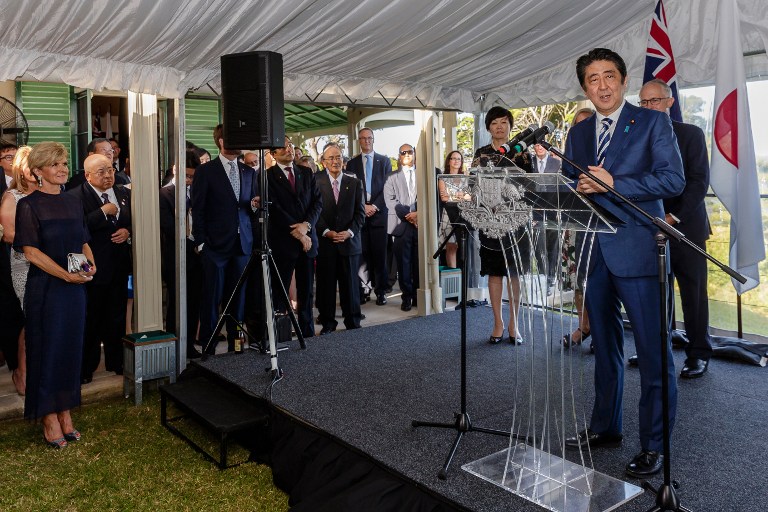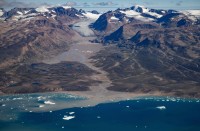
Japan and Australia will work together to ensure the Trans-Pacific Partnership free trade deal comes into force, Prime Minister Shinzo Abe said on January 14, making no mention of strong US opposition. / AFP PHOTO / POOL / Brook Mitchell
Sydney, Australia (AFP) — Japan and Australia will work together to ensure the Trans-Pacific Partnership free trade deal comes into force, Prime Minister Shinzo Abe said Saturday, making no mention of strong US opposition.
After talks with Australian Prime Minister Malcolm Turnbull, Abe took the lead on the trade pact covering 12 Pacific Rim nations that was ratified by Japan’s parliament last month.
“We agreed that we should demonstrate anew to the world the importance of free trade,” Abe told reporters.
“We confirmed that we would coordinate for the early entry into force of the TPP.”
The two men later released a joint statement which “stressed that implementing the TPP remains an indispensable priority because of the significant economic and strategic benefits it offers.”
Turnbull noted, “For both of our nations the United States remains the cornerstone of our strategic and security arrangements.
“We will work closely with the incoming administration, as we have been (doing), to advance the region’s interest and our shared goals.”
He had earlier told NHK television in an interview that Australia would “commend” the TPP to the new administration.
US President Barack Obama championed the deal saying it would enable Washington to set the global trade agenda in the face of China’s increasing economic might.
But President-elect Donald Trump has repeatedly shot it down as bad for America and particularly for jobs, casting a dark shadow over its future.
The TPP encompasses some 40 percent of the global economy and also includes Brunei, Canada, Chile, Malaysia, Mexico, New Zealand, Peru, Singapore and Vietnam.
Unveiled in 2016 and years in the making, the TPP cannot be implemented in its current form without US ratification.
Abe has made it a pillar of his growth platform to revive exports and the world’s number three economy.
Trump says he supports free trade but that existing deals, such as the North American Free Trade Agreement between the US, Canada and Mexico, have not been fairly negotiated and do not serve US interests.
Close allies Canberra and Tokyo announced Saturday a new defence deal to facilitate closer logistics support and cooperation during combined exercises, training and peace-keeping operations.
And they called on their defence ministers “to pursue deeper defence cooperation in 2017, including joint training, exercises, operations and capacity building.”
They also unveiled an agreement to exchange sporting expertise with Japan due to host the 2019 Rugby World Cup followed by the summer Olympics in 2020.
The prime ministers “condemned in the strongest terms North Korea’s continued nuclear tests and multiple ballistic missile launchers as destabilising and provocative and urged North Korea to desist”.
They also voiced “serious concern” at the South China Sea situation, urging restraint by all parties.
The Japanese leader arrived in Sydney from the Philippines on Friday night and will continue Sunday his trip that will also take in Indonesia and Vietnam.
This is Mr Abe’s first visit to Australia since Mr Turnbull became Prime Minister in September 2015, the pair shared a morning walk on a trail overlooking Sydney Harbour before a bilateral meeting at Kirribilli house, local media reported.
“We share democratic values and a common interest, a vested interest in the maintenance of rules based international order upon which the prosperity of our region and the world depends,” Turnbull told Mr Abe at the meeting.
“We are above all vitally committed to free trade and open markets. We recognize and agree, as we have previously at the G20 and APEC, that protectionism is not a ladder to get us out of the low growth trap but rather a shovel to dig us deeper into it,” Turnbull added.
Abe echoed Turnbull’s sentiments on protectionism, adding that the United States would be a key partner for both nations leading into US President-elect Trump’s administration.
“The regional security environment has been increasingly severe and also the parallel phenomenon globally. There is a growing trend of anti-globalism as well as protectionism and to ensure free and open international order based on the rule of law, our bilateral cooperation and trilateral cooperation with the United States is of utmost importance,” Abe said.
Abe leaves Australia on Sunday (January 15), travelling on to Indonesia and Vietnam for further talks on trade and security, local media reported.
(Agence France Presse with Reuters)







